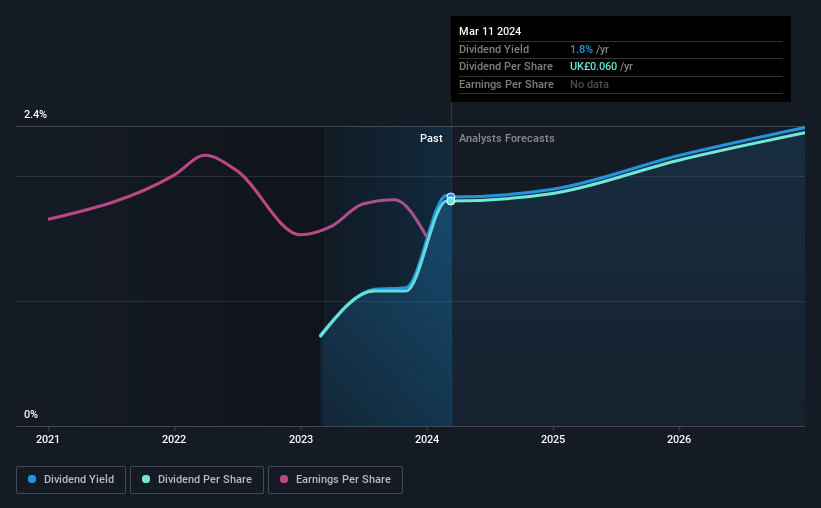Stock Analysis
- United Kingdom
- /
- Personal Products
- /
- LSE:HLN
Is It Worth Considering Haleon plc (LON:HLN) For Its Upcoming Dividend?

It looks like Haleon plc (LON:HLN) is about to go ex-dividend in the next day or so. The ex-dividend date is usually set to be one business day before the record date which is the cut-off date on which you must be present on the company's books as a shareholder in order to receive the dividend. It is important to be aware of the ex-dividend date because any trade on the stock needs to have been settled on or before the record date. Accordingly, Haleon investors that purchase the stock on or after the 14th of March will not receive the dividend, which will be paid on the 16th of May.
The company's next dividend payment will be UK£0.042 per share. Last year, in total, the company distributed UK£0.06 to shareholders. Last year's total dividend payments show that Haleon has a trailing yield of 1.8% on the current share price of UK£3.275. If you buy this business for its dividend, you should have an idea of whether Haleon's dividend is reliable and sustainable. So we need to investigate whether Haleon can afford its dividend, and if the dividend could grow.
View our latest analysis for Haleon
If a company pays out more in dividends than it earned, then the dividend might become unsustainable - hardly an ideal situation. Haleon is paying out an acceptable 53% of its profit, a common payout level among most companies. A useful secondary check can be to evaluate whether Haleon generated enough free cash flow to afford its dividend. It paid out 19% of its free cash flow as dividends last year, which is conservatively low.
It's encouraging to see that the dividend is covered by both profit and cash flow. This generally suggests the dividend is sustainable, as long as earnings don't drop precipitously.
Click here to see the company's payout ratio, plus analyst estimates of its future dividends.

Have Earnings And Dividends Been Growing?
Companies with falling earnings are riskier for dividend shareholders. If business enters a downturn and the dividend is cut, the company could see its value fall precipitously. So we're not too excited that Haleon's earnings are down 2.9% a year over the past three years.
Unfortunately Haleon has only been paying a dividend for a year or so, so there's not much of a history to draw insight from.
Final Takeaway
Has Haleon got what it takes to maintain its dividend payments? The payout ratios are within a reasonable range, implying the dividend may be sustainable. Declining earnings are a serious concern, however, and could pose a threat to the dividend in future. In summary, while it has some positive characteristics, we're not inclined to race out and buy Haleon today.
If you're not too concerned about Haleon's ability to pay dividends, you should still be mindful of some of the other risks that this business faces. Every company has risks, and we've spotted 2 warning signs for Haleon you should know about.
If you're in the market for strong dividend payers, we recommend checking our selection of top dividend stocks.
Valuation is complex, but we're helping make it simple.
Find out whether Haleon is potentially over or undervalued by checking out our comprehensive analysis, which includes fair value estimates, risks and warnings, dividends, insider transactions and financial health.
View the Free AnalysisHave feedback on this article? Concerned about the content? Get in touch with us directly. Alternatively, email editorial-team (at) simplywallst.com.
This article by Simply Wall St is general in nature. We provide commentary based on historical data and analyst forecasts only using an unbiased methodology and our articles are not intended to be financial advice. It does not constitute a recommendation to buy or sell any stock, and does not take account of your objectives, or your financial situation. We aim to bring you long-term focused analysis driven by fundamental data. Note that our analysis may not factor in the latest price-sensitive company announcements or qualitative material. Simply Wall St has no position in any stocks mentioned.
About LSE:HLN
Haleon
Engages in the research, development, manufacture, and sale of various consumer healthcare products in North America, Europe, the Middle East, Africa, Latin America, and the Asia Pacific.
Mediocre balance sheet with limited growth.

